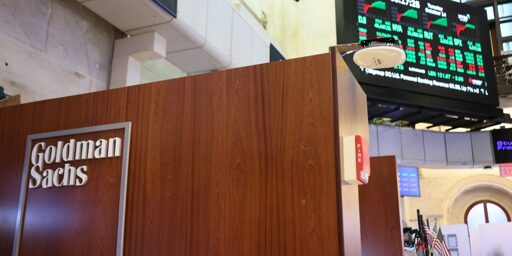Goldman Sachs Group Inc.’s chief credit strategist Lotfi Karoui is leaving the Wall Street bank after 18 years, according to an internal memo reviewed by Bloomberg.
Karoui, who was also the head of credit, mortgages and structured products research, was named chief credit strategist in 2017 and was among 95 executives promoted to partnership in November.
His departure comes as Goldman Sachs’s chief US equity strategist, David Kostin, is set to retire from the bank at the end of the year, Bloomberg reported last month.
…
A representative for Goldman confirmed his departure but declined to comment further. Karoui didn’t respond to requests for comment.
Emphasis mine, and editorial below.
Ok, so, guy is with GS for 18 years, gets promoted to partner less than a year ago… and now he is suddenly leaving, with no comment from either himself or GS…
Millenials and older; does anyone remember what was going on with Goldman Sachs roughly 18 years ago?
Other investment banks?
Something about mortgage backed securities?
… How did that all turn out?


Honestly, it turned out great, houses became affordable again.
People trying to retire, and who were recently retired got stiffed in the ass hard. Took them like a decade to bounce back. At my age, I have like 15 years before retirement is feasible, a half million in retirement funds, and like 150k liquid, and own a house. I’m waiting for the next housing collapse. The family needs a bigger house, and we can afford one, but the market still has its head up it’s ass. A 1600sqft ranch in my area, is not, and never had been a 250k home. When that’s what Zillow shows as the estimate for the house my wife and I bought 6 years ago, for 160k (which honestly was too much then. It’s a 120-145k house, end of story) then I know the market is still living in fucking fantasy land. A correction is due. A correction is coming.
So, if this turns into a giant financial contagion, uh, unless your retirement funds are mostly in gold…
If this proportionately follows the GFC, your half million in retirement turns into about a quarter million, doesn’t recover back to that half million for 4 years.
If this proportionately follows the 1929 crash, your half million in retirement turns into about $60k, doesn’t recover to a half million for about 12 years.
My guess is this current/upcoming crash is going to be much closer to that latter, than the former.
If this unwinds along with the US Bond market, of which it was recently revealed that the largest foreign holder of US debt is about $1.8 trillion held by the… Cayman Islands, aka, hedge funds like Goldman Sachs, leveraged 50:1 to 100:1… well then interest rates break the Fed’s ability to manipulate them and hit I dunno maybe 10% to 15% ish range.
But, the better news is that you apparently fully own a house, as in the mortgage is paid off free and clear, so if you sell right now, you could probably get $200k to $225k for it, or if you wait a year or two or three, more like that $150k ish you correctly suspect is probably its more realistic value, and then you could buy, with all your liquid cash + the proceeds of the old home sale, another, larger home.
Or uh… sell the home, move into an apartment, and then still have kinda mostly sorta have your retirement money intact.
Its of course regionally variable, but broadly, renting an apt is cheaper than paying a new mortage on a home right now, plus when you factor in all the other costs of homeownership.
But… if I read ‘own a house’ wrong, and you… just bought this home 6 years ago, and you are still making payments on it, 30yr fixed, that means you have an interest rate somewhere around 3.5% to 4.5%…
And if you’re looking at financing a new home purchase in … the next decade-ish, you’ll be adding about 10% to 15% to those interest rate numbers if the US Bond market collapses along with the US Stock market… so… about 14%ish to 19%ish … and … that’s less than great…
And that’s also assuming you don’t get seriously injured, come down with any kind of serious medical condition, or lose your job… during a Depression, in a country actively destroying its health care system in basically every way possible.
Oh and we are also not factoring rising insurance rates, property taxes, and food costs, all things that happen in a Depression, aka, a real correction.